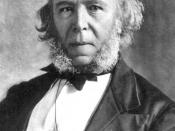Psychological Egoism Versus Ethical Egoism Psychological egoism is a theory about people and how they usually or always act for their own interest. It is a claim that people always act selfishly to foster their own happiness. It is comparable to psychological hedonism which is the claim that people act in a way to attain their own pleasure and avoid personal pain. Is there truth to this theory or claim? Ethical egoism is a theory that believes people should act in their own interest and there is a difference between selfishness and self-interest. Which one is the most accurate?Is psychological egoism a fact? If it is truthful, then ethics in general has a lot of things to elaborate on. Most ethical systems require at least some altruism which is unselfish behavior. If psychological egoism is all fact, then altruism would not be possible in society today. There seems to be many arguments that support this theory.
According Feinburg four arguments are1. Every action is prompted by ones own motives or desires which makes them each person's own.
2. When a person obtains something he/she wants then they feel happiness3. People can deceive themselves about selfish motives4. Some appeal to pain and pleasure to instill morality.
Ayn Rand is a supporter of this theory, along with Thomas Hobbs. They often use the above arguments to support their beliefs in psychological egoism. But it is a surprising weak claim I think. There are several reasons to believe that this form of egoism is not valid. There are several counterexamples such as the firemen who rush into burning buildings to save lives. Yes you could say it is their job, and they probably earn medals and become small town heroes for doing this, but do they stop and consider the benefits of saving...


